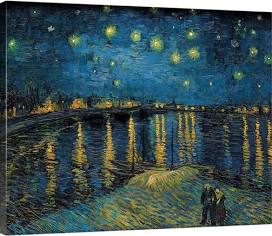Lend Me Your Ear
/A Brief Review of “Loving Vincent”
A film written & directed by Dorota Kobiela
& Hugh Welchman
Review by John Bennison, Mountain Shadow Director
Starry, starry night
Flaming flo’rs that brightly blaze
Swirling clouds in violet haze reflect
in Vincent’s eyes of China blue.
“Vincent” (“Starry, Starry Night”) by singer/songwrite Don McLean, 1971
As the film begins, it’s Summer, 1891, and in Paris a young Armand Roulin is given a letter
by his father to hand-deliver to Theo, the brother of his father’s friend Vincent van Gogh; the latter who, they have just heard, has apparently just killed himself in Auvers-sur-Oise. This is a small village outside Paris, where van Gogh had temporarily taken up residence for ten weeks to feverishly paint landscapes and portraits daily from sun-up to sundown.
But Armand is disenchanted with his mission to deliver the letter; as well as his father’s association with Vincent, a foreign painter who had cut off a portion of his earlobe in a fit of rage when presumably quarreling with his contemporary Paul Gauguin. Van Gogh was subsequently
committed for a time to a local asylum.
In Paris, Armand learns that a grieving Theo died shortly after the death of his brother, Vincent. But he also learns it was Theo who helped Vincent discover his artistic genius; becoming an emerging sensation among the post-Impressionist masters like Gauguin and Cézanne.
Armand can’t help but wonder why Vincent -- on the brink of fame and success -- would take his own life under what turns out to be very curious circumstances. So begins a murder mystery of sorts, with each character dropping possible clues along the way. Auvers is the quintessential French village, where the rumor mill and reality seem to always blur together; rendering fact from fiction indistinguishable.
After painting alone in the fields one day, the artist stumbles back to the Ravoux Inn, bleeding with a bullet in his stomach that is presumably self-inflicted. Mortally wounded, he dies two days later at the age of 37. The untimely death of a burgeoning artist who was considered half-mad and half-genius makes for a rich concoction of opinions that only adds to the mystery.
The total charm of the film, however, is to be found less in the whodone- it-if-Vincent-didn’t storyline; and more in the manner in which each character (first filmed by real live actors) vividly comes to life as if van Gogh had painted them himself (as he often did) through his own artistic eye, and in his own easily identifiable style.
Where the visual artist is often viewed as one who replicates and renders on canvas the world they observe around them, the fatally flawed van Gogh essentially becomes instead the director of his own storyline that is so vividly portrayed for the viewer’s enjoyment.
Through the paint brushes of 125 impersonator’s, it is as if the irrascible artist himself is visually narrating his own autobiography. “Lend me your ear,” he seems to say, “and I’ll tell you a tale!”
And now I understand what you tried to say to me
How you tried to set them free.
They would not listen, they did not know how
Perhaps they'll listen now.









